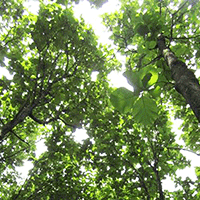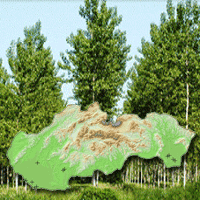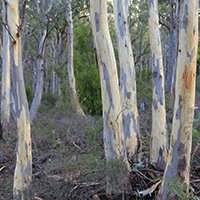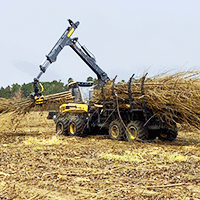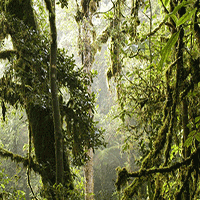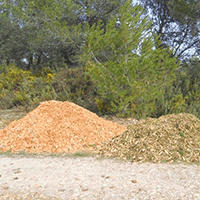
Comparison of alternative harvesting systems for selective thinning in a Mediterranean pine afforestation (Pinus halepensis Mill.) for bioenergy use
Victoria Lerma-Arce (1) , Jose-Vicente Oliver-Villanueva (1), Guillem Segura-Orenga (2), Javier F Urchueguia-Schölzel (1)
iForest - Biogeosciences and Forestry, Volume 14, Issue 5, Pages 465-472 (2021)
doi: https://doi.org/10.3832/ifor3636-014
Published: Oct 16, 2021 - Copyright © 2021 SISEF
Research Articles
Abstract
Due to a continuous abandonment of marginal agricultural land, Mediterranean pine forests are growing both in biomass stock and area but remain mainly unmanaged. Pinus halepensis is one of the main pioneer species with strong expansion throughout the Mediterranean basin. In mature forests and pole stands, selective thinnings aimed to eliminate dominated and dead trees are necessary to improve the resilience and persistence of these forest ecosystems. Bioenergy market provides an opportunity to mobilise this woody material, helping to prevent and reduce wildfires in a context of climate change and energy transition. Despite the existing expertise on wood harvesting, there is a lack of practical knowledge about cost-effective methods for bioenergy use of selective thinnings in such forests. The objective of this study was to compare thinning harvesting methods in representative 63-year-old Pinus halepensis afforestation in pole stage for bioenergy uses, following the silvicultural treatments defined in the Spanish forest management plan. Time studies were performed over six representative plots in Navalón (Spain). Treatments included three plots with the traditional stem wood method combined with the logging of forest residues (integrated system), and three plots with the whole tree chipping (whole tree system). Time, productivity and fuel consumption were recorded for both systems. A woodchip quality assessment of each assortment was performed in the laboratory according to European standards. The results obtained demonstrated that time consumption and productivity were similar between the integrated harvesting system and the whole tree system. Regarding the total energy balance, it should be noted that both systems produce woodchips that contain over ten times more energy than that required to mobilise and process the obtained biomass. Fuel consumption, costs and degree of damage were slightly higher in the whole tree system due to the more intensive forwarding operation. The two assortments of woodchips in the integrated system had a higher (chipped log material) and lower quality (chipped crown material) than whole tree woodchips. In conclusion, integrated harvesting is a better option to diminish fuel consumption, cost and environmental impact, and also to obtain better quality woodchips for the production of added value biofuels (pellets).
Keywords
Pinus halepensis, Selective Thinnings, Bioenergy Harvesting, Logging Residues, Woodchips, Net Energy Efficiency, Whole-tree Biomass
Authors’ Info
Authors’ address
Jose-Vicente Oliver-Villanueva 0000-0003-2842-7834
Javier F Urchueguia-Schölzel 0000-0002-3054-3431
Universitat Politècnica de València, Institute for Information and Communication Technologies - ITACA, Research Group on ICT vs. Climate Change, Camí de Vera s/n, 46022 València (Spain)
AIDIMME - Wood&Metal Technology Institute, Benjamin Franklin 13, 46180 Paterna (Spain)
Corresponding author
Paper Info
Citation
Lerma-Arce V, Oliver-Villanueva J-V, Segura-Orenga G, Urchueguia-Schölzel JF (2021). Comparison of alternative harvesting systems for selective thinning in a Mediterranean pine afforestation (Pinus halepensis Mill.) for bioenergy use. iForest 14: 465-472. - doi: 10.3832/ifor3636-014
Academic Editor
Rodolfo Picchio
Paper history
Received: Aug 27, 2020
Accepted: Aug 10, 2021
First online: Oct 16, 2021
Publication Date: Oct 31, 2021
Publication Time: 2.23 months
Copyright Information
© SISEF - The Italian Society of Silviculture and Forest Ecology 2021
Open Access
This article is distributed under the terms of the Creative Commons Attribution-Non Commercial 4.0 International (https://creativecommons.org/licenses/by-nc/4.0/), which permits unrestricted use, distribution, and reproduction in any medium, provided you give appropriate credit to the original author(s) and the source, provide a link to the Creative Commons license, and indicate if changes were made.
Web Metrics
Breakdown by View Type
Article Usage
Total Article Views: 32807
(from publication date up to now)
Breakdown by View Type
HTML Page Views: 27842
Abstract Page Views: 2373
PDF Downloads: 2019
Citation/Reference Downloads: 4
XML Downloads: 569
Web Metrics
Days since publication: 1574
Overall contacts: 32807
Avg. contacts per week: 145.90
Citation Metrics
Article Citations
Article citations are based on data periodically collected from the Clarivate Web of Science web site
(last update: Mar 2025)
Total number of cites (since 2021): 9
Average cites per year: 1.80
Publication Metrics
by Dimensions ©
Articles citing this article
List of the papers citing this article based on CrossRef Cited-by.
References
Productivity and cost of cut-to-length and whole-tree harvesting in a mixed-conifer stand. Forest Products Journal 57: 59-69.
Gscholar
Estudios de tiempos de cosechadoras forestales en una seria de aprovechamientos de primera clara en masas de Pinus radiata y Pinus sylvestris en el distrito forestal VII de Galicia [Timing studies of forest harvesters in a series of first thinnings in Pinus radiata and Pinus sylvestris stands in Forest District VII of Galicia]. In: Proceedings of the “Congreso Forestal de Portugal 2005”, Lisboa (Portugal) 16-19 May 2005. Sociedade Portuguesa de Ciências Florestais, Viseu, Portugal, pp. 8. [in Spanish]
Gscholar
El control de tiempos y rendimientos en los trabajos forestales. El programa Kronos [The control of times and yields in forestry work. The Kronos program]. Revista Montes 87: 14-20. [in Spanish]
Gscholar
Cost horari de la maquinària forestal [Hourly cost of the forest machinery]. Institut d’Edicions de la Diputació de Barcelona, Xarxa de Municipis, Àrea d’Infraestructures, Urbanisme i Habitatge, Oficina Tècnica de Prevenció Municipal d’Incendis Forestals Quaderns d’Informació Tècnica, Barcelona, Spain, pp. 95. [in Catalan]
Gscholar
Aprovechamiento de la biomasa forestal producida por la cadena monte-industria. Parte II: Cuantificación e implicaciones ambientales [Use of forest biomass produced by the forest-industry chain. Part II: Quantification and environmental implications]. CIS-Madera 10: 27-37. [in Spanish]
Gscholar
Post-fire forest management in southern Europe: a COST action for gathering and disseminating scientific knowledge. iForest - Biogeosciences and Forestry 3 (1): 5-7.
CrossRef | Gscholar
Best practices and technologies to develop green wastes and residues as raw materials for variants of utilization. LIFE07 ENV/D/000240 Layman report, European Commission, Brussels, Belgium, pp. 15.
Gscholar
Solid biofuels - Determination of moisture content - Oven dry method. Asociación Española de Normalización y Certificación, Madrid, Spain, pp. 33.
Gscholar
Solid biofuels - Determination of ash content. Asociación Española de Normalización y Certificación, Madrid, Spain, pp. 12.
Gscholar
Solid biofuels - Determination of calorific value. Asociación Española de Normalización y Certificación, Madrid, Spain, pp. 61.
Gscholar
Solid biofuels - Fuel specifications and classes - Part 1: General requirements. - Part 4: Wood chips for non-industrial use. Asociación Española de Normalización y Certificación, Madrid, Spain, pp. 116.
Gscholar
Solid biofuels - Methods for the determination of particle size distribution - Part 1: Oscillating screen method using sieve apertures of 3.15 mm and above. Asociación Española de Normalización y Certificación, Madrid, Spain, pp. 32.
Gscholar
Promoción del uso de la biomasa forestal con fines energéticos en el Suroeste de Europa (2004-2007) [Promotion of the use of forest biomass for energy purposes in Southwest Europe (2004-2007)]. Interreg SUDOE, Final Report 978-972-96003-7-1, Santiago de Compostela, Spain, pp. 44. [in Spanish]
Gscholar
Forest bioenergy in the protected Mediterranean areas - ForBioEnergy. Final Report, Interreg MED Project ForBioEnergy, Palermo, Italy, pp. 240.
Gscholar
Harvesting alternatives and cost factors of delimbed energy wood. Forestry Studies. Metsanduslikud Uurimused 45: 49-56.
Gscholar
Energy consumption by energy wood supply. In: Proceedings of the “OSCAR Conference in Forest Operation Research in the Nordic Baltic Region”. Honne (Norway) 20-22 Oct 2010. Norsk Institutt for Skog og Landskap, Norway, pp. 100.
Gscholar
Production and costs of cut-to-length thinning: experience from the Willamette young stand project. Forest Research Laboratory, Oregon State University, Corvallis, OR, USA, pp. 23.
Gscholar
Comparison of two cut-to-length harvesting systems operating in eastern hardwoods. International Journal of Forest Engineering 12 (1): 53-59.
Gscholar
Planificación, logística y valorización de biomasa forestal residual en la provincia de Valencia [Planning, logistics and recovery of residual forest biomass in the province of Valencia]. PhD Thesis, Universitat Politècnica de València, Spain, pp. 230. [in Spanish]
Gscholar
Good practice guidelines for biomass production studies. COST Action FP-0902, WG2 “Operations Research and Measurement Methodologies”, CNR-IVALSA, Sesto Fiorentino, FI, Italy, pp. 52.
Gscholar
Producción de biomasa y fijación de CO2 por los bosques españoles [Biomass production and CO2 fixation by Spanish forests]. Monografías INIA, Serie Forestal no. 13, Madrid, Spain, pp. 270. [in Spanish]
Gscholar
Optimal intensity and age management in young Aleppo pine stands for post-fire resilience. Forest Ecology and Management 255 (8-9): 3270-3280.
Gscholar
Plan de acción territorial forestal de la comunidad Valenciana [Forest territorial action plan of the Valencian community]. VAERSA, Conselleria d’Infraestructures, Territori i Medi Ambient, Valencia, Spain, pp. 860. [in Spanish]
Gscholar
Promotion of residual forestry biomass in the Mediterranean basin. Final Project Report, INTERREG MED 1S-MED 10-009, Murcia, Spain, pp. 252.
Gscholar
SWOT analysis and strategy development for forest supply chains in South East Europe. Forest Policy and Economics 61: 87-94.
CrossRef | Gscholar
The effect of mechanization level and harvesting system on the thinning cost of Mediterranean softwood plantations. Silva Fennica 48 (1): 15.
Gscholar
El aprovechamiento de biomasa residual (ramas y copas) en cortas a hecho de coníferas en Soria (España) [The use of residual biomass (branches and tops) in conifers clear-cuttings in Soria (Spain)]. In: Proceedings of the “6ª Congreso Forestal Español: Montes: Servicios y Desarrollo Rural”. Vitoria-Gasteiz (Spain) 10-14 June 2013. Sociedad Española de Ciencias Forestales, 6CFE01-520, Palencia, Spain, pp. 12. [in Spanish]
Gscholar
Evaluation de la croissance du pin d’Alep en région méditerranéenne française [Assessment of the growth of Aleppo pine in the French Mediterranean region]. Revue Forestière Française 5: 11. [in French]
Gscholar




